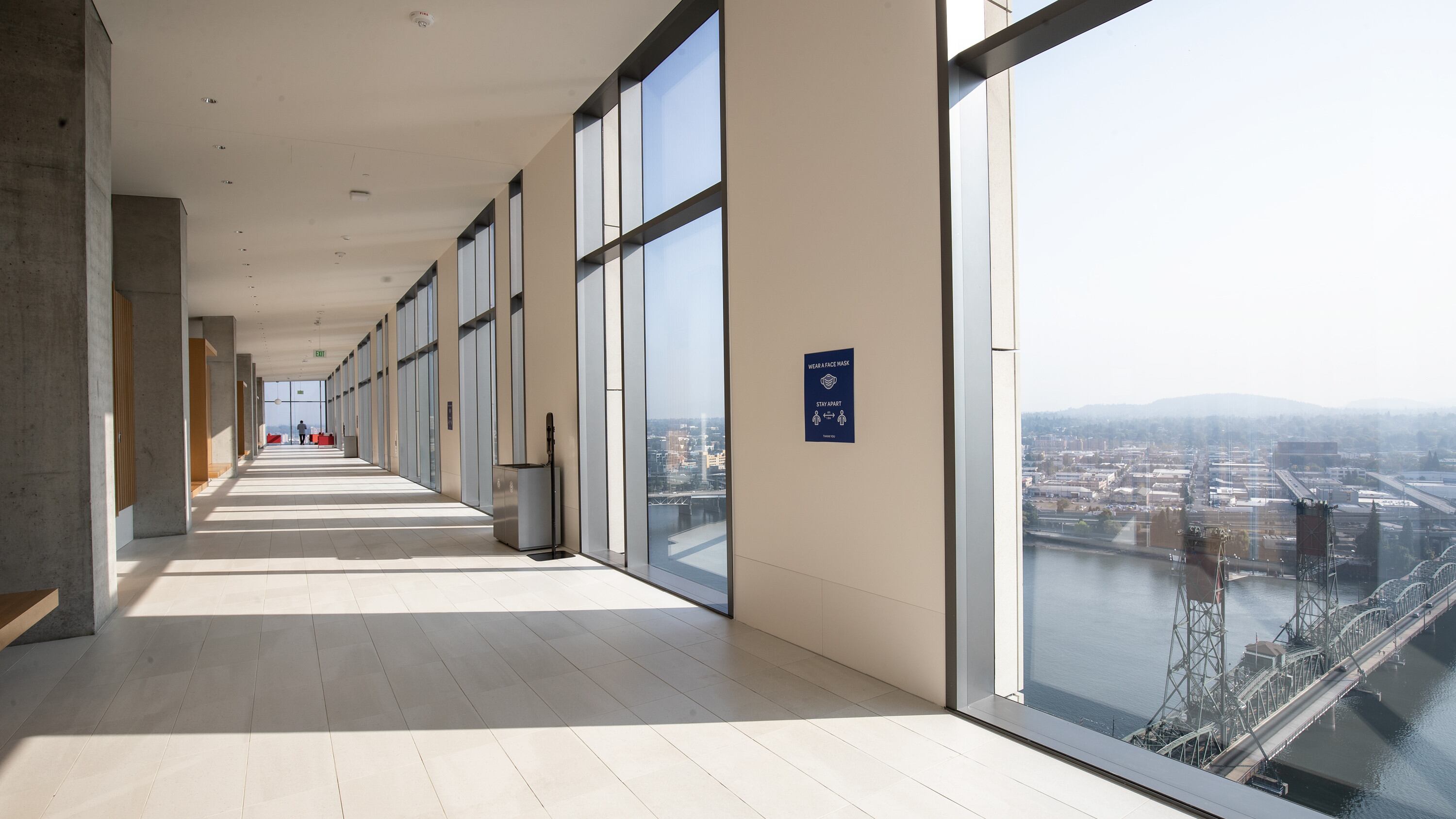The new 17-story Multnomah County Courthouse is a marvel of architectural design and high-tech wizardry.
But one feature of the $330 million courthouse is a head-scratcher: the room marked “Law Library and Legal Resource Center,” a space of about 1,750 square feet that contains only a handful of books.
Historically, law libraries, which Oregon statute requires each county to have, are repositories of thick legal texts, collections of historical briefs and opinions, and other printed matter. There are more computer screens than books in the space set aside in the new courthouse.
“To me, that’s not a law library,” says Martha Renick, who has worked in Oregon law libraries for three decades and has directed the nonprofit Multnomah Law Library since 2013. Renick’s library occupied parts of two floors in the old county courthouse vacated last year.
As the new courthouse took shape, how to define such a library became a notably contentious saga—which grew to include a change in state law, dueling members of the influential Kafoury family, and three librarians shipped to a hidden sanctum several blocks away. The drama illustrates how hard it is for tradition-bound institutions like the law and government agencies to grapple with technological change.
The result: two publicly funded law libraries within five blocks of each other downtown. One has many books but few clients, the other has many clients but few books.
Lawyer Scott Kocher began trying cases in the old courthouse in 2001. He recalls often taking clients into the old library for a quiet chat. He says the law library issue is “complex.”
“How do you preserve history versus how do you provide the access to justice and resources that lawyers and [unrepresented] litigants need?” he asks.
Instead of dusty legal tomes, the “library” on the second floor in the new courthouse at 1200 SW 1st Ave. comprises a room full of computer terminals along with seven full-time “navigators.” These are court staffers who help people without lawyers deal with the Byzantine legal system.
The navigators and the absence of actual books are the brainchild of former Multnomah County Presiding Judge Nan Waller. In preparation for the new courthouse, Waller pushed to do away with a century-old approach to helping lawyers and the public do legal research, with shelves full of books and a library staff of seven.
Her concern: a large and growing percentage of civil litigants who can’t afford lawyers and can’t make sense of law books. Studies show a majority of divorce and eviction cases involve at least one unrepresented party.
“We see this as an access-to-justice issue,” says Rachel McCarthy, a spokeswoman for the Oregon Judicial Department.
To make the shift in how the courthouse serves the public, Waller decided to grab most of the money—about $1.5 million a year—that the Judicial Department formerly sent to the Multnomah Law Library.
That required Waller and her allies, including then-Oregon Supreme Court Chief Justice Thomas Balmer, other local judges, and County Chair Deborah Kafoury, to go to the Legislature in 2018 to change the statute dictating how counties’ law libraries were funded.
The Multnomah Law Library (a private nonprofit that gets all its funding from court fees—i.e., public money) fought back.
Renick hired a Salem lobbyist—Stephen Kafoury, Chair Kafoury’s father. It still wasn’t enough. Legislators amended the law library statute—but only for counties with populations over 700,000 (Oregon has only one, Multnomah).
“When they went after our money, it happened quickly,” Renick says. “I’m still angry about it.”
Renick managed to hold onto about $300,000 a year ($110,000 of that goes to her salary, according to tax filings). But when Multnomah County Circuit Court staff relocated to the new, vastly larger building last October, there was no room for Renick and her books.
“We determined that the rate of use of the law library did not justify the expense of building the space necessary to house the law library in the courthouse,” says Multnomah County spokesman Mike Pullen. “Placing the law library outside the courthouse allowed for lawyers to have easier access without having to go through security and is in better proximity to their offices.”
As a consolation prize, Multnomah County pays the rent for the Multnomah Law Library’s 5,500-square-foot space in the Sixth + Main building adjacent to the old courthouse.
It’s a spiffy, ground-floor location just off an elegant marble lobby and newly installed smart elevators. The rent: $7,500 a month—$90,000 a year—for a library that is technically open only to members of the bar. Missing: customers.
On a recent day, Renick’s holdover library was as quiet as a tomb. The sign-in sheet for the week of Aug. 24 showed just eight names. An oak phone booth salvaged from the old courthouse stood as forlornly empty as the rest of the space.
“We rarely have more than two lawyers come in at a time,” Renick says. “Five would be a busy day—but we do a brisk business over the phone and via email.”
Renick acknowledges the world has changed. Most legal reference books are available digitally. Judges and lawyers depend primarily on legal databases rather than printed texts. But some important documents have not been digitized, and Renick says there is plenty of demand for a librarian’s services from lawyers who don’t have access to the libraries and legal resources that big firms possess.
Still, Renick is pessimistic her institution will last beyond the end of its five-year lease. But Waller’s vision of a public law library holds no interest for her.
“I haven’t gone into the new courthouse to see the new law library,” Renick says. “I can hold a grudge a really long time.”

